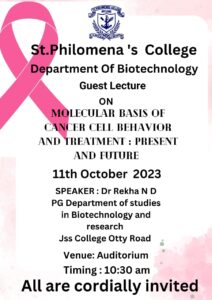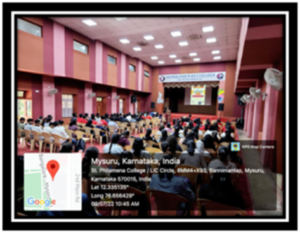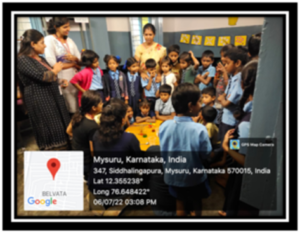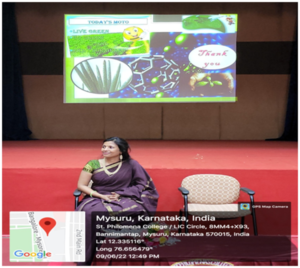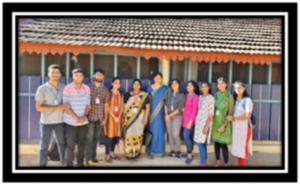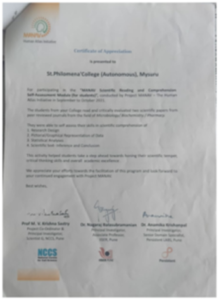Department of Biotechnology
The Department of Biotechnology was established in the year 2004 with the vision of offering courses in emerging branches of life sciences that integrate technological advancements. The program is designed to provide students with a strong foundation in biotechnology while emphasizing its practical applications in various industries.
The department offers a job oriented curriculum that is interdisciplinary, combining subjects such as Chemistry, Zoology, Biochemistry, Microbiology, and Food Science & Nutrition. With a focus on research and innovation, it equips students with the necessary skills for careers in healthcare, pharmaceuticals, agriculture, environmental science, and bioinformatics. Over the years, the department has grown with modern laboratory facilities, experienced faculty ensuring students receive both theoretical knowledge and hands on training. Additionally, workshops, seminars, and internships are regularly organized to keep students updated with the latest advancements in the field.
Mission:
The mission of the Biotechnology Department is to advance the frontiers of biological science through innovative research, exceptional education, and industry collaboration. We aim to equip students with the knowledge, skills, and ethical grounding necessary to excel in the biotechnology field. Our commitment is to foster a learning environment that encourages critical thinking, creativity, and interdisciplinary approaches to solving real-world challenges, ultimately contributing to the betterment of society through biotechnological advancements.
Vision:
The Biotechnology Department envisions becoming a global leader in biotechnology education and research, driving innovation and excellence in the development of sustainable solutions for health, agriculture, and the environment. We aspire to produce graduates who are not only experts in their field but also responsible global citizens who contribute to scientific progress and the welfare of humanity. Through innovative research, meaningful collaboration, and a commitment to scientific excellence, we strive to advance biotechnology and create a lasting impact that benefits society and future generations.
Best Practices of the Department
Adapting Student-Centric Methods in Biotechnology Education: Adapting student-centric methods in biotechnology education transforms traditional teaching into a more interactive and personalized learning experience. These approaches prioritize students’ needs, interests, and learning styles, allowing them to take an active role in understanding complex biotechnological concepts. Techniques such as hands-on laboratory experiments, collaborative research projects, and technology integration like virtual simulations and interactive learning tools empower students to engage with the subject in practical and meaningful ways. This approach enhances motivation and retention, as students apply theoretical knowledge to real-world biological and industrial applications. By emphasizing student participation and continuous feedback, teaching strategies can be tailored by educators to address individual challenges and strengths, ultimately fostering deeper comprehension and innovation in the field of biotechnology.
Classes and Discussions Based on Visual Sources
Classes and discussions that incorporate visual sources are highly effective educational tools, particularly in fields like biotechnology, where complex concepts often require more than just verbal or written explanations. Utilizing visual aids such as diagrams, videos, simulations, and infographics helps to simplify intricate processes, making them more accessible and easier to grasp. These resources can vividly illustrate concepts like DNA replication, cell structures, and biotechnological processes in ways that text alone cannot. They cater to diverse learning styles, engaging visually oriented students while enhancing comprehension for all learners.
Discussions centered on visual sources promote active participation, critical thinking, and deeper engagement with the subject matter. Students can analyze visual data, interpret experimental results, and critique methodologies depicted in videos, leading to more interactive and dynamic learning experiences. This approach not only reinforces understanding but also fosters creativity, as students learn to visualize and conceptualize their own ideas in response to the material presented. Ultimately, integrating visual sources into classes and discussions enriches the learning experience, making complex scientific knowledge more tangible, relatable, and memorable.
Hands on Laboratory Training
Hands-on laboratory training is a fundamental aspect of biotechnology education, providing students with extensive practical exposure through well-equipped labs. By engaging in experimental work, students gain a deeper understanding of theoretical concepts and develop essential technical skills. Additionally, encouraging students to undertake small research projects fosters critical thinking, problem-solving abilities, and innovation. This hands-on approach not only enhances learning but also prepares students for research, industry, and higher education opportunities in the field of biotechnology.Bottom of Form
Industrial and Research Institution Visits
Industrial and research institution visits play a crucial role in bridging the gap between academic learning and real-world applications in biotechnology. Organizing field visits to biotech industries, R&D laboratories, and research institutions allows students to gain firsthand experience of the latest advancements and operational workflows in the field. These visits provide valuable exposure to industrial production techniques, quality control measures, and regulatory compliance processes, helping students understand industry standards and best practices. Additionally, facilitating internships with biotech companies and startups enhances practical learning, equipping students with hands-on experience, professional networking opportunities, and a deeper insight into career prospects within the biotechnology sector.
Conferences, Seminars, and Competitions
Active participation in conferences, seminars, and competitions is essential for enhancing students’ knowledge, research skills, and professional development in biotechnology. Encouraging students to take part in national and international biotech competitions provides them with a platform to showcase their innovative ideas, gain recognition, and stay updated with the latest advancements in the field. Organizing events such as poster presentations, hackathons, and innovation challenges fosters critical thinking, creativity, and problem-solving abilities. These activities not only promote academic excellence but also help students build confidence, network with experts, and explore potential career and research opportunities in biotechnology.
Integration of Technology in Learning
The integration of technology in learning is essential for modern biotechnology education, enhancing both theoretical understanding and practical skills. Implementing Learning Management Systems (LMS) facilitates seamless communication, online assignments, and discussions, creating a collaborative and flexible learning environment. Additionally, encouraging students to enroll in online certification courses from reputed platforms broadens their knowledge base, exposes them to global advancements, and enhances their employability. By leveraging technology, biotechnology education becomes more dynamic, efficient, and aligned with industry trends.
Mentoring of Students: A Best Practice in Biotechnology Education
Faculty mentoring is a vital aspect of academic and professional growth, particularly in biotechnology education. Beyond traditional classroom teaching, mentorship provides personalized guidance, knowledge transfer, and support to help students navigate their academic and career paths. Faculty mentors serve as role models, offering insights into research methodologies, ethical considerations, and industry opportunities while fostering critical thinking, innovation, and confidence. Through this guidance, students are better equipped to succeed as future scientists, researchers, and industry professionals.
To strengthen mentoring as a best practice, a dedicated WhatsApp group was created to facilitate instant communication between students, parents, and faculty. After internal examinations, parent meetings were conducted to discuss student progress, and individual counseling was provided to those in need of additional support. To ensure focused attention, the class was divided into smaller groups with a designated group leader. Peer teaching, guided by these leaders, and was introduced to assist academically weaker students, fostering collaboration and a supportive learning environment. This structured mentoring approach enhances student engagement, academic performance, and overall personal and professional development, making it an integral part of biotechnology education.


